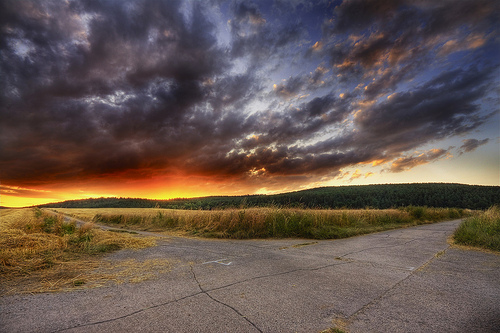
(Image, “Road to Hell”, stolen from Alexander West.)
And I did not mean to shout, just drive
Just get us out, dead or alive
The road’s too long to mention, Lord, it’s something to see
Laid down by the Good Intentions Paving Company
(Joanna Newsom)
John Key’s government is starting to play for keeps after a year and a bit warming up. There have been a few clear examples of this, including the aggressive tax and service cuts in Budget 2010, and signs pointing to privatisation in the not-too-distant future. Less orthodox is the recent hardening of the government’s position on take MÄori.
Key was not punished for his calculated snub of TÅ«hoe, and it seems the success has emboldened him to flip the bird to an even larger MÄori audience, saying two things: that MÄori can take or leave the government’s public domain proposal for the Foreshore and Seabed; and that by “MÄori” he means “the mÄori party”. It’s these things I want to discuss, and they need a bit of unpacking.
Pragmatism and principle
Conventional wisdom on the Left is that Key’s blowing off MÄori is (either) paying the red-neck piper, or a genuine manifestation of his (and the government’s) own racism. I think it’s neither and a bit of both. On the second bit, I accept that the National party’s history on MÄori issues is broadly racist inasmuch as it hangs on a “one law for all” rhetorical hook whilst systematically opposing measures which safeguard the equal application of those laws to MÄori, but I think this is down to the casual racism of privileged ignorance rather than the malicious anti-MÄori sentiments of Orewa. Key’s politics, I am convinced, consist of a thick layer of pragmatism on a thin frame constructed of a few very strong principles. The principles are not the bulk of his politics, but they strictly delineate the extremes of what he will and won’t accept. Fundamentally on cultural issues he’s a pragmatist, and doesn’t much care either way as long as he’s getting his. But there is a solid core there which is only so flexible, and changing the ownership status of huge tracts of land (whether by Treaty settlement in the case of Te Urewera or by nationalisation in the case of the Iwi Leadership Group’s suggestion regarding privately-owned sections of the Foreshore and Seabed) is too much of a flex. There are good principled reasons for National to oppose such a scheme, and for this reason I don’t think he’s pandering to the redneck base so much as preserving what he perceives to be the National Party’s immortal soul: cultural conservatism and the maintenance of material property rights. Although I broadly disagree with the reasons, and the decisions, I wish that Labour had done as much to preserve its own immortal soul in 2004 and 2005.
“One law for all”
While I’m on record opposing a “public domain” resolution of the Foreshore and Seabed because it’s a solution of convenience rather than one born of any deep consideration of the issues in play, I have a little more time for Mark Solomon’s suggestion that if MÄori are to give up nascent property rights to the takutai moana, those already holding such property rights ought to be obliged to do the same. I’m not convinced by arguments from PC and DPF to the contrary. PC’s argument, that iwi and hapÅ« ought to have full common-law recourse to test their claims as permitted by the Court of Appeal ruling in favour of NgÄti Apa has more merit than DPF’s, but I still consider it a poor option since there is a high likelihood of a culturally and politically repugnant outcome which would lack durability and further inflame racial hatred. Contrary to DPF’s claim that Solomon’s position is unprincipled, Tim Watkin argues that it’s actually a pretty good representation of “one law for all”. It would ensure that existing landowners — most of whom happen to be PÄkehÄ — are not grandfathered into a new scheme simply by virtue of having bought land which may or may not have been legitimately acquired from whomever it was bought, while iwi and hapÅ« — who happen to be exclusively MÄori — are forced to give up their rights. I argued much the same thing a few days ago, and I’m pleased to see someone else thinking along the same lines. While the whole Foreshore and Seabed going into public domain is worse than Hone Harawira’s proposal that the land be vested in customary title with ironclad caveats because it strips away rights rather than granting them, it does have the advantage of stripping those rights equally, rather than on the basis of largely racial discrimination.
There is another, economic, point in play: if land not presently in private ownership is placed in the public domain and declared inalienable, the increased value of those few freehold, fee-simple property rights which do exist at present will have a phenomenal distortive effect on the property market and on New Zealand’s social structure, with the inevitable result that almost every scrap of it will end up in foreign ownership. We will then have the perverse and incoherent result that most of the beaches will be owned in common — but those which aren’t will be the exclusive domains of ultra-wealthy foreigners. Whether this is a good or a bad thing is a fair point for debate, but I think this fact will grant Solomon’s proposal considerable appeal to the broader New Zealand public, especially among those who do not — and even at present prices, could never — own waterfront property.
Just who are these “MÄori”, anyway?
As I noted above, Key has been clear that he cares not a whit for the Iwi Leadership Group’s views on the matter: he considers that the mÄori party has a mandate to negotiate for all MÄori and the decision is theirs. This is strictly almost correct: they do have a such a mandate, and whatever they decide will be broadly regarded as legitimately representing “MÄori”, to the extent that the decision accords broadly with the views of MÄori as expressed by their various civil society agencies. This proviso, missing from Key’s glib assessment of the political situation, is crucial. By omitting it, Key aims to drive a wedge between the party and those civil society agencies — chief among them the Iwi Leadership Group convened for this very purpose — from whom they ultimately derive their electoral mana. The mÄori party, frequent howls of “sellout!” from the Marxist left notwithstanding, do regularly test their policy positions against these stakeholder groups, at hui, and in their electorates. This makes them particularly secure in terms of their support, as long as they act in accordance with their supporters’ wishes. I have long criticised the howlers for misunderstanding just what it is that the mÄori party stands for, and their mischaracterisation of the party — plump buttocks in the plush leather seats of ministerial limousines, representing “big brown business” — is similarly a wedge, of a slightly different hue. But this issue is the test. Without the support of the Iwi Leadership Group, it’s hard to see how the mÄori party could maintain its claim to a mandate.
Crossroads
Which brings me to the verse at the top of this post. This issue has deteriorated to the point that the National government — like the Labour government before it — issuing public ultimatums to MÄori and prejudging the case by claiming to speak for the mÄori party’s position. That is not mana-enhancing for a coalition partner which has showed enormous patience and swallowed almost innumerable dead rats in exchange for largely symbolic concessions. This breakdown of diplomacy on its own is not sufficient to call time on the coalition relationship — that comes down to the merits of the choices available, and the proposal simply isn’t enough. I have long defended this approach on the basis that the big issues were still to play out — but the loyalty and commitment shown by the mÄori party, in the teeth of furious criticism from enemies and allies alike, must be rewarded. A Whanau Ora pilot programme simply isn’t enough. This road was paved with good intentions, and there was a chance it would lead elsewhere than where it did — a chance which had to be taken but which, barring a swift change in the government’s position, seems to have proven unfounded.
If the government holds to its ultimatum, the mÄori party must turn around and walk back into the light. On this I agree with Rawiri Taonui (audio). The party will lose much more by abandoning its people and agreeing to a Faustian bargain than by simply failing to negotiate the repeal of the Foreshore and Seabed Act, which realistically was a nearly impossible task in any case. And even if the party did support the bill, it would not mean the end of the struggle. As Taonui says, although they might have the numbers to pass the legislation, the government’s solution will have no legitimacy or durability in practice without the support of the ILG and those it represents. Where there is injustice, resistance will seep out around the edges. If the issue of the takutai moana remains live, the party can continue to advocate for a just and enduring solution, and the ILG’s proposed solution opens a potential route for re-engagement with the Labour party. All is not lost.
The big question — as I asked in r0b’s excellent thread the other day is: what will Labour do?
They can sit back and say “I told you so†to the mÄori party, hoping they will fold, or they can make a better offer and hope the mÄori party will become more inclined to work with them. I can see how either would be a reasonable tactical position in terms of electoral numbers, even though the former course of action would continue the erosion of Labour’s historically liberal and MÄori support. But there’s also a real danger the party will do neither, or will attempt to do both and fail at doing either, such as by arguing that the FSA was actually not that bad after all. That would be a tragedy.
The whole world’s watching. I have to say Shane Jones, who the party desperately needs if it is to have credibility on this issue, hasn’t helped dispel the predominant impression of MÄori politicians held by the New Zealand public.
L


